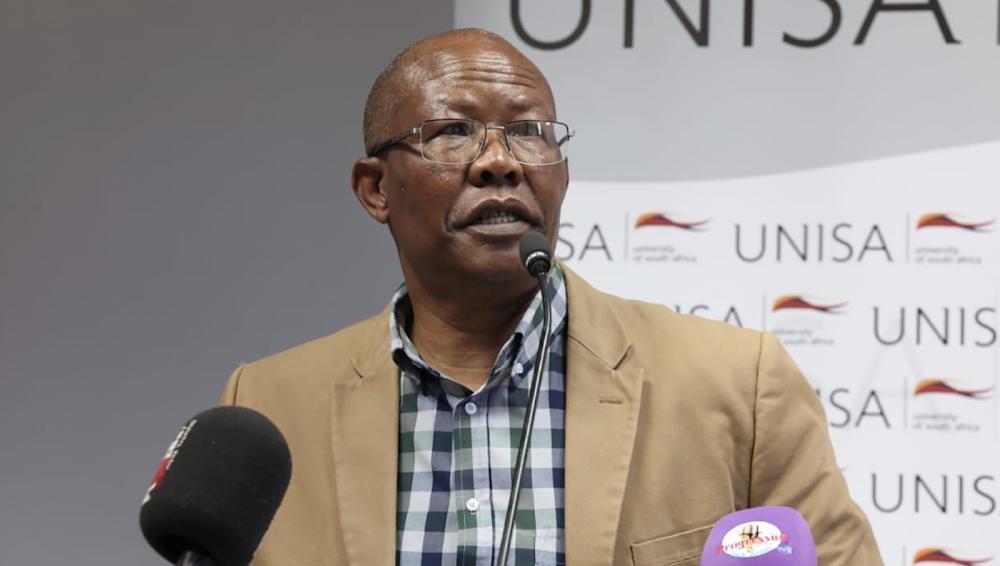Africa-Press – South-Africa. In the wake of the withdrawal of legacy foundations from the national dialogue preparatory task team, a convention organising committee has been established to proceed with the first instalment of the countrywide talks.
The new cohort is made up of representatives from civil society, Nedlac, Unisa and the Presidency, with the immediate task being to organise and run a convention scheduled for Friday.
Briefing the media at Unisa, the chairperson of the convention organising committee Boichoko Ditlhake, from the Kagiso Trust, said the collective must not allow any grouping to control a process that should belong to citizens and society.
This follows tensions between the Thabo Mbeki Foundation and others who are believed to have locked horns with President Cyril Ramaphosa over a range of issues, including who controls the dialogue process, its budget and the timing of the first convention.
Despite the row, the dialogue’s organisers have expressed their intention to go ahead with their initial plans.
“Our task is to ensure this process is handed over to a broadly representative steering committee that will be established at the first national convention,” Ditlhake said.
“There is no need for unnecessary delays. We must move swiftly to hand over the process to civil society and citizen organisations that have genuine interest in solving the challenges our country faces.”
The organising committee includes volunteers from about 20 civil society organisations.
Ditlhake said the support and contributions they have received from stakeholders has helped to reduce the costs of the convention.
Unisa has offered to host the first convention and provide goods and services free of charge. A venue for the plenary, two overflow venues with live streaming, 10 breakaway venues, a dining area and work areas have been secured.
“[The first convention on Friday] marks the start of the national dialogue process. The dialogue will take the form of public dialogues across the country in communities and sectors over several months. The process will culminate in the second national convention in the first half of 2026.”
About 1,000 delegates are expected to attend. Ditlhake said 755 people have so far been invited from 30 sectors and 200 organisations. An additional 245 delegate spaces will be set aside for organisations that have asked to participate or those that have not been covered sufficiently.
“In allocating spaces, efforts have been made to ensure sectoral diversity and representativity, special weighting for marginalised or historically underrepresented groups and representative in all sectors of youth, women and LGBTQI+ individuals.”
The first convention is intended to discuss the need for and value of a national dialogue, and outline and agree on key themes for discussion. “It will need to agree on the approach and modalities for the nationwide public dialogues at sectoral and community level and set up a broadly representative steering committee to co-ordinate the implementation of the national dialogue.”
The committee said the president is empowered by section 83 of the constitution to enable citizens to hold a conversation on the South Africa they envisioned.
“The head of state, as the convener, has called the first national convention to kick-start the process. A number of structures work together to support and co-ordinate the process, which includes the eminent persons group appointed by him. Their duty is to provide advice and guidance.”
There is also an interministerial committee chaired by Deputy President Paul Mashatile, which comprises all relevant departments to co-ordinate government’s contribution.
A steering committee will be established at the first convention. Ditlhake said it will comprise various sectors to set the priorities and co-ordinate implementation of the national dialogue process. After the first convention and its subsequent engagements around the country, the second national convention is expected to bring these threads together.
“The second instalment will agree on a shared vision and shape a national compact for transformation,” Ditlhake said
“This dialogue is decentralised by design. Power lies with communities, not the ‘centre’. It is diverse and inclusive, reaching the unreached and amplifying marginalised voices. It will be connected and iterative, with feedback loops from community to national and back again. It will be action-orientated; using dialogue as a tool for concrete change, not just conversation.”
For More News And Analysis About South-Africa Follow Africa-Press






